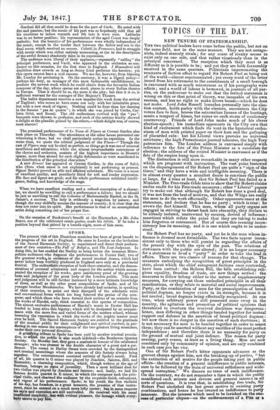SPOHR.
The present visit of this illustrious musician has been of great benefit to the progress of his art in England. He came to London on the invitation of the Sacred Harmonic Society, to superintend and direct their perform- ance of two oratorios—The Fall of Babykn, and The Last Judgment. In doing this, he has enabled the Society to bring before the immense Metro- politan audiences who frequent the performances in Exeter Hall, two of the greatest worksi,in existence of the sacred musical drama, which had never before been worthily produced in England save only at a provincial festival. The enthusiastic reception of both these oratorios, and the demon- strations of personal admiration and respect for the author which accom- panied the reception of his works, gave satisfactory proof of the growing taste and judgment of the great body of the London public. This taste and judgment will be still further increased by a more intimate knowledge of these, as well as the other great compositions of Spohr, and of his younger brother Mendelssohn. We have already had occasion, in speaking of their oratorios, to point out their disregard of the scholastic rules and conventional forms which too long fettered the genius of the com- poser, and which those who have formed their notions of an oratorio from the works of Handel, only, think essential to this species of composition. The almost exclusive performance of Handel's music in Exeter Hall has tended to keep alive this bigotry; which will be dissipated by an acquain- tance with the more free and varied forms of the modem school, without lessening the veneration in which the works of the mighty master must ever be held. The Sacred Harmonic Society are entitled to the gratitude of the musical public for their enlightened and spirited conduct, in pro- ducing in one season the masterpieces of the two greatest living musicians, under their own personal direction. A gratifying tribute to Spohr has been paid by another musical associa- tion, to which the public is also much indebted—the Beethoven Quartet Society. On Monday last, they gave a matinee in honour of the celebrated stranger; who was present in the double character of a guest and a per- former. The rooms in Harley Street were crowded by the distinguished and musical assemblage whom the concerts of this Society always bring together. The entertainment consisted entirely of Spohr's music. First of all, his quartet in G minor was played by Joachim, Sainton, Hill, and ,Rousselot; a charming composition which, though written at the age of fourteen, betrays no signs of juvenility. Then a most brilliant duet for two violins was played by Joachim and Sainton ; and, lastly, we had his Famous double quartet in E minor, in which the composer took the prin- cipal violin, and charmed the audience by the exquisite finish, refinement, and vigour of his performance. Spohr, in his youth the first violinist of bis day, has forsaken, in a great measure, the practice of that instru- ment, since he entered on a much more lofty career; but in some respects his style and execution are still unrivalled. He received with his usual unaffected simplicity, but with evident pleasure, the homage which every- body strove to pay him.


























 Previous page
Previous page